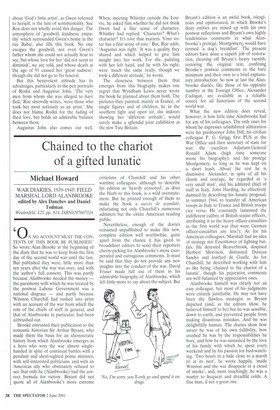Chained to the chariot of a gifted lunatic
Michael Howard
WAR DIARIES, 1939-1945: FIELD MARSHAL LORD ALANBROOKE edited by Alex Danchev and Daniel Tochnan Weidenfeld, £25, pp. 814, ISBN0297607316 ON NO ACCOUNT MUST THE CONTENTS OF THIS BOOK BE PUBLISHED.' So wrote Alan Brooke at the beginning of the diary that he was to keep from the first day of the second world war until the last. But published they were, little more than ten years after the war was over, and with the author's full consent. This was partly because Alanbrooke needed the money — the parsimony with which he was treated by the postwar Labour Government was a national disgrace — and partly because Winston Churchill had rushed into print with an account of the war from which the role of the chiefs of staff in general, and that of Alanbrooke in particular, had been airbrushed out.
Brooke entrusted their publication to the romantic historian Sir Arthur Bryant, who made them the basis for an idiosyncratic history from which Alanbrooke emerges as a hero who won the war almost singlehanded in spite of continual battles with a petulant and short-sighted prime minister, with self-interested politicians, and with an American ally who obstinately refused to see that only he (Alanbrooke) had the correct formula for victory. Bryant did not quote all of Alanbrooke's more extreme
criticisms of Churchill and his other wartime colleagues, although to describe his edition as 'heavily censored', as does the blurb to this book, is a wild overstatement. But he printed enough of them to make the book a succes de scandale, infuriating not only Churchill's numerous admirers but the entire American reading public.
Nevertheless, enough of the diaries remained unpublished to make this new, complete edition well worthwhile, quite apart from the chance it has given to broadsheet editors to send their reporters cherry-picking for Alanbrooke's more exasperated and outrageous comments. It must be said that they do not provide any new insights into the conduct of the war. David Fraser made full use of them in his admirable biography of Alanbrooke, which left little more to say about the subject. But










































































 Previous page
Previous page